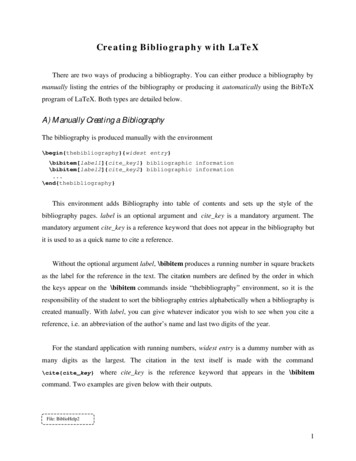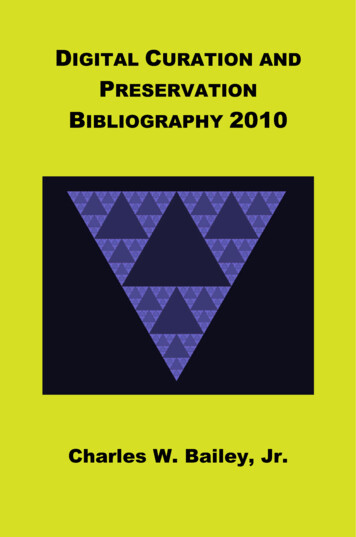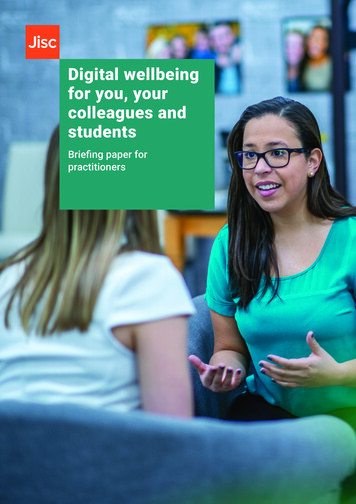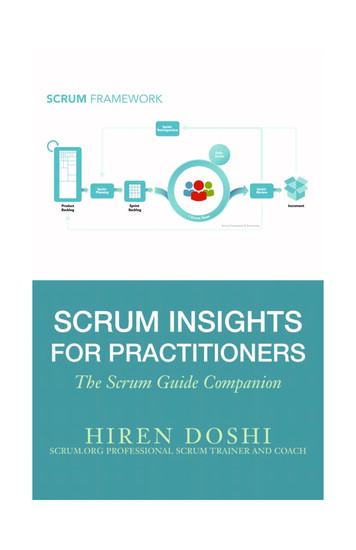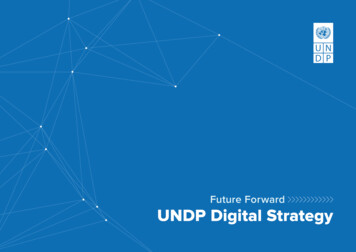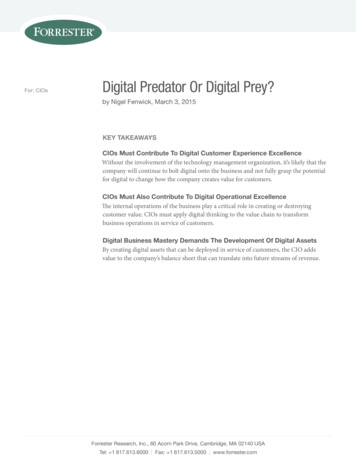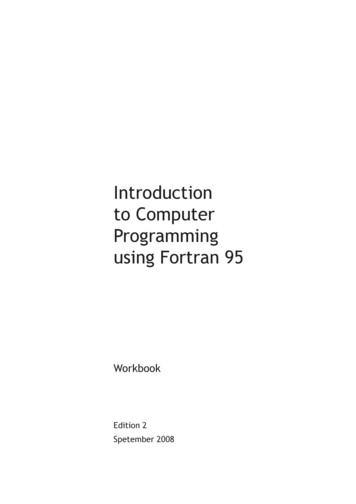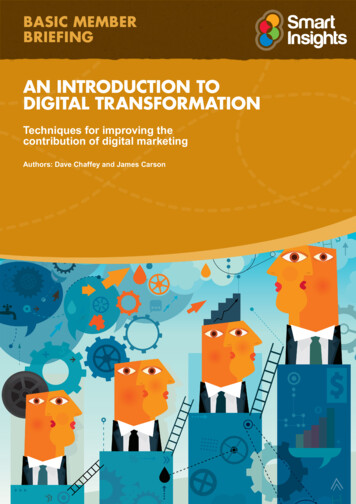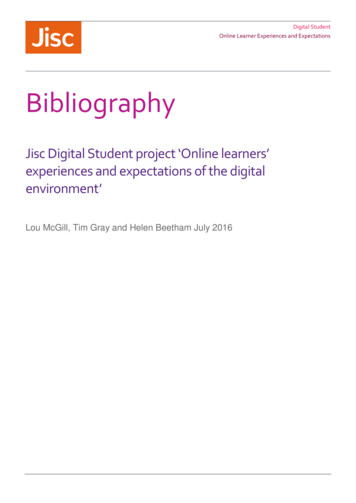
Transcription
Digital StudentOnline Learner Experiences and ExpectationsBibliographyJisc Digital Student project ‘Online learners’experiences and expectations of the digitalenvironment'Lou McGill, Tim Gray and Helen Beetham July 2016
Online Learner Experiences and EpectationsBibliographyContentsIntroduction . 3Other literature reviews and meta-analysis. 4Factors influencing the outcomes of online learning . 6Comparative literature . 16Case study evidence and evaluation studies . 19Qualitative and mixed-method research studies . 23Lou McGill, Tim Gray and Helen Beetham, July 2016
Online Learner Experiences and EpectationsBibliographyIntroductionThis bibliography was developed during the Jisc Digital Student study on Online learners’ expectations andexperiences of the digital environment. A significant element of the study was a literature review.Due to the extensive research literature on online and distance learning, our searches were limited topapers published after 2012, although some key papers before that date were included. Over 270 paperswere included in the review and were collated in an open online library. Studies that involved learnersthrough large-scale surveys and/or detailed qualitative work were prioritised as well as studies that focusedon the learning experience, rather than teaching, course design, or organisational issues. These included: Factors influencing the outcomes of online learning using measures such learners' engagement,progression, satisfaction, successful completion and credits/grades achieved comparative literature whichcontrasts online and offline learning activities or experiences or contrasts differently designed onlinelearning components Case study evidence conducted from the perspective of teachers and online learning designers andevaluation studies of specific online courses or interventions Qualitative and mixed-method research studies which provide a focused theoretically informed andrich picture of online learners' experiences from a variety of perspectives Feedback from learners - surveys carried out by researchers, online learning providers, and somenational bodiesSearch terms used:At the outset our database search terms were: online learningonline learnersMOOCopen learningvirtual learningnetworked learning.plus ionTo these we later added emotions, disability, retention, curriculum design, socio-economic status,social class, educational disadvantage, cultural, second language students, diversityLou McGill, Tim Gray and Helen Beetham, July 2016
Online Learner Experiences and EpectationsBibliographyOther literature reviews and meta-analysis1. Alem, F., Plaisent, M., Bernard, P., Chitu, O., 2014. Student Online Readiness Assessment Tools: ASystematic Review Approach. e-Journal of e-Learning 12, 376–384.http://www.ejel.org/volume12/issue4/p376 Keywords online learners, readiness2. Bang, J., 2015. MOOCs in Europe: A Literature Cs in Europe.pdf Keywords online learners,MOOC, Europe3. Beetham, H., White, D., Wild, J., 2013. Students’ expectations and experiences of the digitalenvironment literature review. Jisc.http://repository.jisc.ac.uk/5573/1/JR0005 STUDENTS EXPECTATIONS LITERATURE REVIEW 2.0.pdf Keywords learning technology, UK, learner expectations, learner experiences4. Bernard, R.M., Borokhovski, E., Tamim, R.M., 2014. Detecting bias in meta-analyses of distanceeducation research: big pictures we can rely on. Distance Education 35, 57433 Keywords distancelearners5. Capdeferro, N., Romero, M., Barberà, E., 2014. Polychronicity: review of the literature and a newconfiguration for the study of this hidden dimension of online learning. Distance Education 35,294–310. line.com/doi/pdf/10.1080/01587919.2015.955249 Keywords onlinelearners,6. Halverson, L.R., Graham, C.R., Spring, K.J., Drysdale, J.S., Henrie, C.R., 2014. A thematic analysisof the most highly cited scholarship in the first decade of blended learning research. Internet &Higher Education 20, 20–34. 10.1016/j.iheduc.2013.09.004 Keywords blended learning, online learners,communication7. Hart, C., 2012. Factors Associated with Student Persistence in an Online Program of Study: AReview of the Literature. Journal of Interactive Online Learning 11, 19–42.http://eric.ed.gov/?id EJ976760 Keywords online learners, USA, HE, retention, learnerachievement8. Hew, K.F., Cheung, W.S., 2014. Students’ and instructors’ use of massive open online courses(MOOCs): Motivations and challenges. Educational Research Review 12, 000128 Keywords onlinelearners, MOOC, learner motivation, learner experienceLou McGill, Tim Gray and Helen Beetham, July 2016
Online Learner Experiences and EpectationsBibliography9. Lee, K., 2015. Discourses and realities of online higher education:a history of [discourses of] onlineeducation in Canada’s Open University (phd). http://eprints.lancs.ac.uk/77614/ Keywords HE,online learners, learner experience10. Means, B., Toyama, Y., Murphy, R., Baki, M., 2013. The Effectiveness of Online and BlendedLearning: A Meta-Analysis of the Empirical Literature. Teachers College Record 115, lications/effectiveness of online and blended learning.pdf Keywords online learners, learner experience, blended learning11. Mitchell, F., 2015. Keys to Success in the Online Accounting Classroom to Maximize StudentRetention. Journal of Higher Education Theory and Practice 15, 36–44. http://www.nabusinesspress.com/JHETP/FranklinM Web15 5 .pdf Keywords online learners, learnerexperience, retention12. Pavlakou, M., Sharpe, R., 2014. Learners’ expectations and experiences of the digital environmentin the Further Education and Skills sector: a review of the literature conducted for the Jisc FEDigital Student project. Jisc. 14/12/JISC-FEDSlit-review-Dec19-branded.pdf Keywords UK, FE, skills, online learners, learner experience,learning technology13. Phillips, B., 2015. A Study of The Skills Sectors’ learners’ expectations and experiences of thedigital environment A Literature Review. es/2016/01/JISC SkillsSectors Literature ReviewSEROFinal.docx Keywords UK, FE, skills, online learners, learner experience, learning technology14. Rienties, B., Rivers, B.A. 2014 Measuring and Understanding Learner Emotions: Evidence andProspects.” Learning Analytics Review.(No. 1) lytics-and-emotions.pdf Keywords online learners, blended learning, learner emotion,learner motivation, learner attitudes, learner achievement, self-regulation15. Sharpe, R., Benfield, G., Roberts, G., Francis, R., 2006. The undergraduate experience of blendede-learning: a review of UK literature and practice. Higher Education files/sharpe benfield roberts francis 0.pdfKeywords UK, HE, online learners, learner experience, learning technology, blended learning16. Tsai, C.-C., Chuang, S.-C., Liang, J.-C., Tsai, M.-J., 2011. Self-Efficacy in Internet-Based LearningEnvironments: A Literature Review. Educational Technology & Society 14, 222–240.http://www.ifets.info/journals/14 4/19.pdf Keywords self-efficacy, online learners, learningtechnologyLou McGill, Tim Gray and Helen Beetham, July 2016
Online Learner Experiences and EpectationsBibliographyFactors influencing the outcomes of online learningLiterature on factors influencing the outcomes of online learning using measures such learners'engagement, progression, satisfaction, successful completion and credits/grades achieved. These studieshelp us to understand how differences among learners influence their experiences of online learning.1. Alem, F., Plaisent, M., Bernard, P., Chitu, O., 2014. Student Online Readiness Assessment Tools: ASystematic Review Approach. e-Journal of e-Learning 12, 376–384.http://www.ejel.org/volume12/issue4/p376 Keywords online learners, readiness2. Alquarashi, E., 2016. Self-Efficacy In Online Learning Environments: A Literature Review.Contemporary Issues in Education Research article/download/9549/9710 Keywordsonline learners, self-efficacy, digital literacy, learner experience3. AOC. A summary discussion of the use of learning technologies in further education: AoC/ALTposition paper., 2014. . Association of Colleges & Association for Learning Technology, arning%20technologies%20in%20Further%20Education 1.pdf Keywords FE,learning technology, USA, blended learning, online learning4. Artino, A.R., Jones, K.D., 2012. Exploring the complex relations between achievement emotionsand self-regulated learning behaviors in online learning. The Internet and Higher Education 15,170–175. chgate.net/publication/257496467 Exploring the complex relations between achievement emotions and self-regulated learning behaviors in online learningKeywords USA, professional learning, online learners, learner achievement, learner emotion, selfregulation5. Betts, K., Cohen, A.H., Veit, D.P., Alphin, H.C., Broadus, C., Allen, D., 2013. Strategies to IncreaseOnline Student Success for Students with Disabilities. Journal of Asynchronous Learning Networks17, 49–64. http://eric.ed.gov/?id EJ1018265 Keywords Disabled learners, distance learners,learner achievement, learner engagement, online learners6. Boling, E.C., Hough, M., Krinsky, H., Saleem, H., Stevens, M., 2012. Cutting the distance indistance education: Perspectives on what promotes positive, online learning experiences. TheInternet and Higher Education, Special issue of the American Educational Research Association’sonline teaching and learning special interest group 15, 118–126. direct.com/science/article/pii/S109675161100090X Keywords HE, USA,distance learners, online learners, sense of community, communication7. Bonk, C.J., Mimi Miyoung Lee, Xiaojing Kou, Shuya Xu, Feng-Ru Sheu, 2015. Understanding theSelf-Directed Online Learning Preferences, Goals, Achievements, and Challenges of MITOpenCourseWare Subscribers. Journal of Educational Technology & Society 18, 349–368.http://www.ifets.info/journals/18 2/26.pdf Keywords mooc, USA, open learning, learnerachievement, learner experience, learner motivation, self-regulationLou McGill, Tim Gray and Helen Beetham, July 2016
Online Learner Experiences and EpectationsBibliography8. Buzdar, M.A., Ali, A., Tariq, R.U.H., 2016. Emotional Intelligence as a Determinant of Readiness forOnline Learning. The International Review of Research in Open and Distributed Learning 17.doi:10.19173/irrodl.v17i1.2149 w/2149Keywords Pakistan, HE, online learners, learner achievement, learner motivation, self-efficacy9. Capdeferro, N., Romero, M., 2012. Are online learners frustrated with collaborative learningexperiences? The International Review of Research in Open and Distributed Learning 13, icle/view/1127 Keywords online learners,collaboration, learner emotion, learner experience10. Chen, R., Bennett, S., 2012. When Chinese learners meet constructivist pedagogy online. HigherEducation 64, 677–691. cgi/viewcontent.cgi?article 2535&context edupapers KeywordsAustralia, cultural differences, HE, online learners, learner experience, learner achievement, senseof community11. Cheng, J., Kulkarni, C., Klemmer, S., 2013. Tools for Predicting Drop-off in Large Online Classes, in:Proceedings of the 2013 Conference on Computer Supported Cooperative Work Companion,CSCW ’13. ACM, New York, NY, USA, pp. 121–124. 45/2441955.2441987 Keywords online learners, retention12. Cole, M.T., Shelley, D.J., Swartz, L.B., 2014. Online instruction, e-learning, and studentsatisfaction: A three year study. The International Review of Research in Open and DistributedLearning 15 w/1748 Keywords USA, HE,learner satisfaction, online learners, blended learning, retention, social presence, retention,interaction13. Cleveland-Innes, M., Campbell, P., 2012. Emotional presence, learning, and the online learningenvironment. The International Review of Research in Open and Distributed Learning 13, rticle/view/1234 Keywords international, HE, distancelearners, online learners, learner emotion, learner experience14. Comer, D.R., Lenaghan, J.A., Sengupta, K., 2015. Factors That Affect Students’ Capacity to Fulfillthe Role of Online Learner. Journal of Education for Business 90, 1007906 Keywords USA, HE,distance learners, online learners, learner expectations, learner perceptions15. Cortez, A., 2014. Predicting International critical Success Factors in elearning: A comparison offour universities from China, Mexico, Spain and USA. Universitat Oberta de 3/276198/Thesis?sequence 1 Keywords HE,international, online learners, cultural differences, digital literacy, identity, interaction, learnerachievement, learner expectations, learner motivation, learner perceptions, learner satisfaction,self-efficacy, social presence, student support16. Crampton, A., Ragusa, A.T., 2012. Communication and Education: Finding the Balance with 24/7Opportunities for Students. International Journal of Technology, Knowledge & Society 8, 75850159 Communication and education findinLou McGill, Tim Gray and Helen Beetham, July 2016
Online Learner Experiences and EpectationsBibliographyg balance with 247 opportunities for students Keywords Australia, HE, distance learners,online learners, communication, interaction, learner expectations, learner satisfaction, studentsupport17. Deveci Topal, A., 2016. Examination of University Students’ Level of Satisfaction and Readiness forE-Courses and the Relationship between Them. European Journal of Contemporary Education 15,7–23. doi:10.13187/ejced.2016.15.7 http://ejournal1.com/journals n/1459666234.pdf KeywordsDistance learners, online learners, readiness, Turkey, HE, learner satisfaction18. Dray, B.J., Lowenthal, P.R., Miszkiewicz, M.J., Ruiz-Primo, M.A., Marczynski, K., 2011. Developingan instrument to assess student readiness for online learning: a validation study. DistanceEducation 32, 29–47. line.com/doi/abs/10.1080/01587919.2011.565496 Keywords readiness,online learners, distance learners, learner achievement19. Dziuban, C., Moskal, P., Thompson, J., Kramer, L., DeCantis, G., Hermsdorfer, A., 2015. StudentSatisfaction with Online Learning: Is It a Psychological Contract? Online Learning hp/olj/article/viewFile/496/141 Keywords USA,HE, online learners, social presence, learner satisfaction, assessment, learner experience, learnerengagement20. Ellis, K., Kent, M., 2010. Disability and New Media. Taylor & ability and New Media.html?id pIHbTdufioMCKeywords accessibility, disabled learners, online learners, learning technology, assistivetechnology21. Foley, A., Ferri, B.A., 2012. Technology for people, not disabilities: ensuring access and inclusion.Journal of Research in Special Educational Needs 12, 192–200. earchgate.net/publication/263752183 Technology for people not disabilities Ensuring access and inclusion Keywords Assistive technology, disabledlearners, accessibility, inclusive technology, online learners22. Fuller, J., Risner, M., Lowder, L., Hart, M., Bachenheimer, B., 2014. Graduates’ Reflections on anOnline Doctorate in Educational Technology. TechTrends: Linking Research & Practice to ImproveLearning 58, 73–80. com/article/10.1007%2Fs11528-014-0771-4 Keywords online learners,learner perceptions, learner experience, HE, USA, distance learners, professional learning, socialpresence, interaction, sense of community23. Hachey, A.C., Wladis, C., Conway, K., 2015. Prior online course experience and G.P.A. as predictorsof subsequent online STEM course outcomes. Internet & Higher Education 25, 11–17.doi:10.1016/j.iheduc.2014.10.003 http://dx.doi.org/10.1016/j.iheduc.2014.10.003 Keywords HE,USA, online learners, readiness, retention, prior online experience24. Harrell, I.L., 2008. Increasing the Success of Online Students. Inquiry 13, .pdf Keywords USA, online learners, learnerexperiences, retention, learner achievement, non-traditional learnersLou McGill, Tim Gray and Helen Beetham, July 2016
Online Learner Experiences and EpectationsBibliography25. Harrison, R., Gemmell, I., Reed, K., 2014. Student satisfaction with a web-based dissertationcourse: Findings from an international distance learning master’s programme in public health. TheInternational Review of Research in Open and Distributed Learning view/1665 Keywords distance learners, onlinelearners, part-time learners, interaction, HE, professional learning, learner satisfaction, studentsupport, UK26. Hart, C., 2012. Factors Associated with Student Persistence in an Online Program of Study: AReview of the Literature. Journal of Interactive Online Learning 11, 19–42.http://eric.ed.gov/?id EJ976760 Keywords online learners, USA, HE, retention, learnerachievement27. Hartnett, M., George, A.S., Dron, J., 2011. Examining motivation in online distance learningenvironments: Complex, multifaceted and situation-dependent. The International Review ofResearch in Open and Distributed Learning 12, icle/view/1030 Keywords online learners, learnermotivation, self-efficacy, social presence28. Hartnett, M., 2016. The Importance of Motivation in Online Learning, in: Motivation in OnlineEducation. Springer Singapore, pp. 5–32. 00700-2 2 Keywords online learners, learner motivation, distance learners29. Hilton, J.L., Graham, C., Rich, P., Wiley, D., 2010. Using online technologies to extend a classroomto learners at a distance. Distance Education 31, 77–92. 1080/01587911003725030 Keywords online learners, distance learners,learning technology30. Hockings, C., Brett, P., Terentjevs, M., 2012. Making a difference—inclusive learning and teachingin higher education through open educational resources. Distance Education 33, 92066 Keywords distancelearners, online learners, HE, UK, diversity, open learning31. Holzweiss, P.C., Joyner, S.A., Fuller, M.B., Henderson, S., Young, R., 2014. Online graduatestudents’ perceptions of best learning experiences. Distance Education 35, 55262#.V4N5vrgrKUkKeywords distance learners, online learners, learner experiences, critical thinking32. Hood, N., Littlejohn, A., Milligan, C., 2015. Context counts: How learners’ contexts influencelearning in a MOOC. Computers & Education 91, 83–91. edirect.com/science/article/pii/S0360131515300683 Keywords mooc, selfregulation, learner motivation, learner experiences, online learners33. Jan, S.K., 2015. The Relationships Between Academic Self-Efficacy, Computer Self-Efficacy, PriorExperience, and Satisfaction With Online Learning. American Journal of Distance Education 29,Lou McGill, Tim Gray and Helen Beetham, July 2016
Online Learner Experiences and EpectationsBibliography30–40. doi:10.1080/08923647.2015.994366 ords self-efficacy, learner satisfaction, online learners, learning technology, learnerexperience34. Jiang, S., Williams, A.E., Warschauer, M., He, W., O’Dowd, D.K., 2014. Influence of incentives onperformance in a pre-college biology MOOC. The International Review of Research in Open andDistributed Learning 15. w/1858 Keywordsmooc, online learners, learner experience, learner achievement, USA35. Jung, I., Kudo, M., Choi, S.-K., 2012. Stress in Japanese learners engaged in online collaborativelearning in English. British Journal of Educational Technology 43, 1016–1029. doi:10.1111/j.14678535.2011.01271.x 535.2011.01271.x/abstract Keywords Japan, HE, collaboration, online learners, learningtechnology, digital literacy, self-efficacy, learner experience, learner perceptions, culturaldifferences36. Ke, F., 2013. Online interaction arrangements on quality of online interactions performed bydiverse learners across disciplines. Internet & Higher Education 16, 000413# Keywords USA, HE,online learners, social networks, communication, identity, cultural differences, age differences37. Kirmizi, Ö., 2014. A Study on the Predictors of Success and Satisfaction in an Online HigherEducation Program in Turkey. International Journal of Education article/viewFile/6322/5333 Keywords Turkey,HE, distance learners, online learners, collaboration, interaction, learner achievement, learnersatisfaction38. Kirmizi, Ö., 2015. The Influence of Learner Readiness on Student Satisfaction and AcademicAchievement in an Online Program at Higher Education. Turkish Online Journal of EducationalTechnology - TOJET 14, 133–142. http://eric.ed.gov/?id EJ1057353 Keywords Turkey, distancelearners, online learners, HE, digital literacy, learner achievement, learner attitudes, learnermotivation self-efficacy, learner perceptions39. Kizilcec, R.F., Bailenson, J.N., Gomez, C.J., 2015. The Instructor’s Face in Video Instruction:Evidence From Two Large-Scale Field Studies. Journal of Educational Psychology 107, 724–739.doi:10.1037/edu0000013 /kizilcec2015instructor.pdf Keywords mooc, learner experience, learnerengagement40. Koller, D., Ng, A., Chung, D., Zhenghao, C., 2013. Retention and Intention in Massive Open OnlineCourses: In Depth. Educause review online. h Keywords mooc, online learners,retention, learner motivation41. Kop, R., 2011. The challenges to connectivist learning on open online networks: Learningexperiences during a massive open online course. The International Review of Research in OpenLou McGill, Tim Gray and Helen Beetham, July 2016
Online Learner Experiences and EpectationsBibliographyand Distributed Learning 12, 19–38. w/882Keywords MOOC, online learners, social presence, communication, connectivism42. Kuo, Y.-C., Belland, B.R., 2016. An exploratory study of adult learners’ perceptions of onlinelearning: Minority students in continuing education. Education Tech Research Dev 1–20.doi:10.1007/s11423-016-9442-9 6-9442-9Keywords USA, adult learners, non-traditional learners, part-time learners, learner experience,self-efficacy, digital literacy, gender differences, age differences, interaction, learner satisfaction43. Lai, K.-W., Khaddage, F., Knezek, G., 2013. Blending student technology experiences in formal andinformal learning. Journal of Computer Assisted Learning 29, 414–425. om/doi/10.1111/jcal.12030/abstract Keywords online learners,informal learning, collaboration, communication, learning technology, mobile devices44. Laurillard, D., 2016. The educational problem that MOOCs could solve: professional developmentfor teachers of disadvantaged students. Research in Learning Technology 9369 Keywordsinternational, mooc, non-traditional learners, professional learners, collaboration, social networks45. Lee, Y., Choi, J., Kim, T., 2013. Discriminating Factors between Completers of and Dropouts fromOnline Learning Courses. British Journal of Educational Technology 44, 328–337. oi:10.1111/j.14678535.2012.01306.x 535.2012.01306.x/abstract Keywords Learner experiences, retention, online learners, selfregulation, study habits, distance learners, metacognition, learner achievement, self-efficacy46. Lee, K., 2015. Discourses and realities of online higher education:a history of [discourses of] onlineeducation in Canada’s Open University (phd). http://eprints.lancs.ac.uk/77614/ KeywordsCanada, HE, online learners, open learning, learner experience47. Leeds, B., 2014. Temporal experiences of e-learning by distance learners. Education Training 56,179–189. doi:10.1108/ET-11-2012-0114 12012-0114 Keywords HE, distance learners, online learners, time management, learnerexperiences48. Lehman, B., D’Mello, S., Graesser, A., 2012. Confusion and complex learning during interactionswith computer learning environments. The Internet and Higher Education, Emotions in onlinelearning environments 15, 184–194. direct.com/science/article/pii/S1096751612000036 Keywords USA. HE,online learners, learner perceptions, learner emotion, interaction49. Ley, K., Gannon-Cook, R., 2014. Learner-Valued Interactions: research into practice. QuarterlyReview of Distance Education 15, /13 16.pdf Keywords online learners,communication, interaction, self-regulation, social networks, learner perceptions50. McKeon, J., 2014. An Investigation into Students’ and Teachers’ Perceptions of Aspects of OnlineLearning. International Journal of Research in Humanities and Social Studies 1, 64–76.Lou McGill, Tim Gray and Helen Beetham, July 2016
Online Learner Experiences and 1-i1/9.pdf Keywords distance learners, online learners, professionallearning, interaction, international, learner motivation, relationships, learner perceptions51. Martin, L., Spolander, G., Ali, I., Maas, B., 2014. The evolution of student identity: A case of caveatemptor. Journal of Further & Higher Education 38, 200–210. line.com/doi/pdf/10.1080/0309877X.2012.722200 Keywords onlinelearners, identity, HE, part-time learners, non-traditional learners, learner achievement, adultlearners52. Mitchell, F., 2015. Keys to Success in the Online Accounting Classroom to Maximize StudentRetention. Journal of Higher Education Theory and Practice 15, 36–44. http://www.nabusinesspress.com/JHETP/FranklinM Web15 5 .pdf Keywords USA, HE, online learners,assessment, communication, retention, learner achievement, collaboration53. Mensch, S., 2015. Improving Distance Education Through Student Online Orientation Classes.Culture & Religion Review Journal 2015, 92.pdf Keywords US, HE, online learners,distance learners, retention, digital literacy, student support54. Newman, T., Beetham, H., Knight, S., 2016. Student digital experience tracker 2016: results fromthe pilot project. Jisc.http://repository.jisc.ac.uk/6436/2/Student digital experience tracker pilot report June 2016 FINAL.pdf Keywords learner experience, UK, learning technology, FE, HE55. Nwankwo, A., 2015. Students’ Learning Experiences and Perceptions of Online Course Contentand Interactions. http://scholarworks.waldenu.edu/dissertations/188 Keywords USA, HE,online learners, interaction, learner perceptions, learner experience56. Oliver, Martin and Domingo, Myrrh and Hunter, Jade and Pan, Lin and Gourlay, Lesley (2014) Pretertiary engagement with online learning : Exploring uses of online learning environments anddigital technology for progression into and through Higher Education. [Report]http://eprints.ioe.ac.uk/19278/ Keywords online learners, online learning, learner engagement,self-regulation, study habits57. Painter, Jr., D., 2015. An Investigation of the Relationship Between Face-to-Face Orientations,Instructor Verbal Immediacy Behaviors, and Persistence in Online Courses. (phd)http://scholarcommons.usf.edu/etd/6006 Keywords USA, FE, online learners, interaction,communication, learner achievement58. Reich, J., 2014. MOOC Completion and Retention in the Context of Student Intent. Educaus
W_2.0.pdf Keywords learning technology, UK, learner . Emotional Intelligence as a Determinant of Readiness for Online Learning. The International Review of Research in Open and Distributed Learning 17. doi:10. . M., Campbell, P., 2012. Emotional presence, learning, and the online learning environment. The International Review of Research in .
